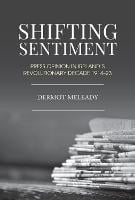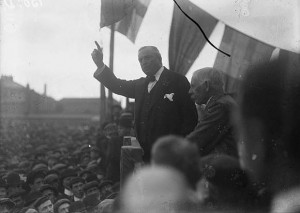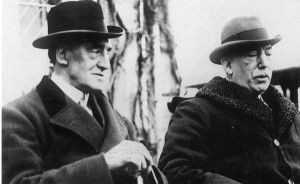Book Review: Shifting Sentiment: Press Opinion in Ireland’s Revolutionary Decade 1914-23”
 By Dermot Meleady
By Dermot Meleady
Published by Wordwell Press, 2023
Reviewer: Eoin O’Driscoll
ISBN: 9781913934347
From a contemporary perspective, living in the Ireland which emerged from the revolutionary period of the early 20th Century, history’s path can appear pre-determined. From those that lived through the period, however, the outcome was far from clear and the period was one of deep uncertainty and turbulence. This perspective is very different from that of those who lived through the turbulent, uncertain years covered by Dermot Meleady’s “Shifting Sentiment: Press Opinion in Ireland’s Revolutionary Decade 1914-23”.
This is a book that challenges, convincingly, the single simplistic narrative that, in Meleady’s words has “dominated” the explanation of the transformation of nationalist opinion in Ireland’s early 20th century
This is a book that challenges, convincingly, the single simplistic narrative that, in Meleady’s words has “dominated” the explanation of the transformation of nationalist opinion in Ireland’s early 20th century – that the execution of the 1916 leaders was the catalyst for the shift from constitutional nationalist to physical force republicanism.
Rather, Meleady argues for a more complex reading of the Irish public’s eventual embrace of the revolutionary ideology espoused by Sinn Féin and promulgated through the Irish Republican Brotherhood. Specifically, Meleady points to “the unresolved contradiction between the all-Ireland terms of the Home Rule Act, placed in the Statute Book in 1914, and the demand of the Ulster unionist community to be excluded from those terms”.
“Shifting Sentiment” brings together a vast array of contemporary press coverage. It tells the story of familiar events from a much-studied decade in Irish history but from an original perspective, that of the then-thriving nationalist regional press.

Through extensive survey and analysis of press coverage and opinion, “Shifting Sentiment” illustrates a gradual erosion of the monilithic Irish nationalism represented by the Irish Parliamentary Party, with whom much of the Ireland’s regional press was at least loosely affiliated, as their popular efforts to pursue Home Rule through constitutional means failed.
From the perspective of those that lived through those times, the emergence of physical force republicanism was not borne of a single dramatic moment (i.e. Easter 1916) but through the slow, tragic exhaustion of constitutional, non-violent means to advance nationalist goals.
“Shifting Sentiment” brings together a vast array of contemporary press coverage of the Irish revolution from the then-thriving nationalist regional press.
While clear fractures in Irish nationalist press opinion are apparent from the beginning, as divisions over the Parnell crisis lingered, Meleady’s study demonstrates strong support for Redmond and his pursuit of constitutional nationalism through the Home Rule bills. Press coverage of Redmond’s repeated failed efforts to secure Home Rule demonstrate a remarkable loyalty to the party’s leader from the nationalist press.
While ongoing failure to secure Home Rule ultimately drives the collapse of Redmond’s party, contemporary blame, at least in press coverage, is aimed less at him personally than the perfidy of the British Government and the effective political machinations of Edward Carson.
Carson’s role can be overlooked in many telling of Ireland’s history. His huge influence over the course of Irish history in this period, however, was evidently well understood by contemporaries as seen in the huge volume of vitriolic coverage of his actions by an outraged Irish press. Carson skillfully managed to ensure that the priorities of the Irish Unionist minority were at the top of Westminster’s agenda through political means but also his willingness to pursue methods that pushed beyond the boundaries of the wholly “constitutional”.

Through contemporary accounts, Meleady demonstrates that Carson’s role in inspiring mutiny within the British army in Ireland and fomenting unrest to undermine the democratic will , as expressed by the British Parliament, to implement Home Rule was well understood in Ireland.
Meleady provides a particularly strident quote from Richard Hazleton, a young MP from the Irish Party, disgusted at Carson’s tactics (and likely his success: “From the Government downwards, in the United States of America, throughout the length and breadth of that great country, there is hardly a single man to be found who does not wonder why the right hon. Member for Trinity College [Carson] was not put up against a wall and shot”.
Carson manoeuvred the apparatus of the British State to ensure that the minority position he represented prevailed and Irish Catholic voices, by some distance the majority of those in Ireland, were disregarded. While, understandably, beyond the scope of Meleady’s work, a study of Unionist press portrayals of Carson and the Home Rule debate would provide a fascinating comparison to the Nationalist press perspective outlined in “Shifting Sentiment”.
Meleady’s Shifting Sentiment is an excellent work and strongly recommended reading for anyone seeking to gain a better understanding
Shifting Sentiment is particularly illuminating in showcasing the various moral fault lines that emerged through the revolutionary decade. As violence escalated, the Irish public (or at least the vast majority of newspaper opinion in the country) was appalled by Irish Republican Army killings of members of the RIC. This condemnation was carried not only in editorials but also through the publication of sermons from appalled members of the Catholic hierarchy pleading for a de-escalation of violence.
Unfortunately, the imposition on press censorship undermines the insight that can be gleaned from the most violent periods of Ireland’s revolutionary decade. However, contemporary press coverage does shine a light on some disturbing episodes in our island’s history that many would rather forget, that lurk just behind major moments in our history.
Most brutally outlined was reporting of the effective ethnic cleansing of Catholics from the parts of Ulster that would become Northern Ireland through mob violence, as Ireland moved towards partition. This was tragically mirrored, if not matched in scale, by a series of murders of Protestant landlords in what would emerge as the Irish Free State and eventually as the Irish Republic.
Meleady’s Shifting Sentiment is an excellent work and strongly recommended reading for anyone seeking to gain a better understanding of how the events of Ireland’s revolutionary decade were understood by those who lived through them. It is a work that does much to bring out the nuance and complexity of years that would define the Irish nation.